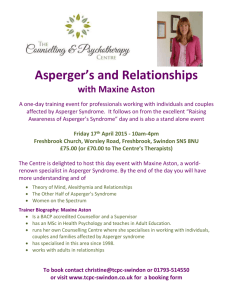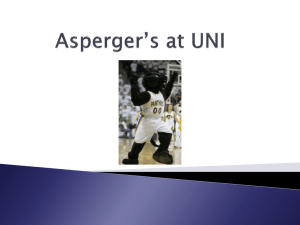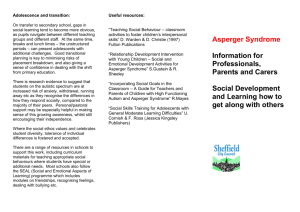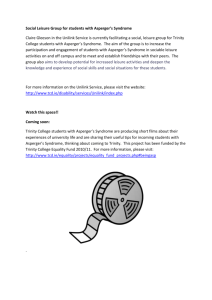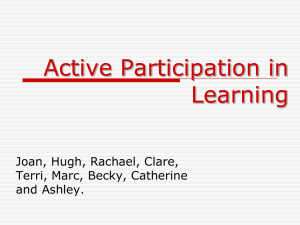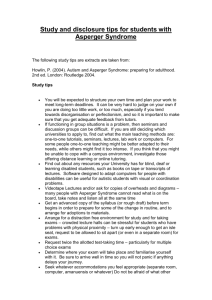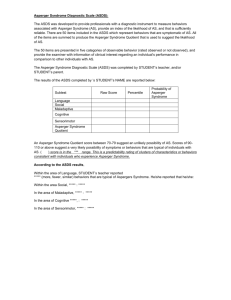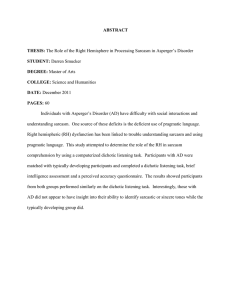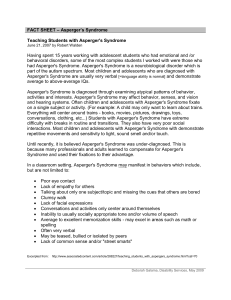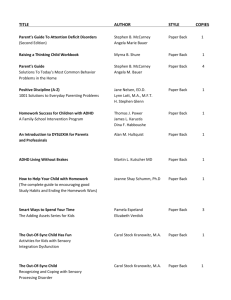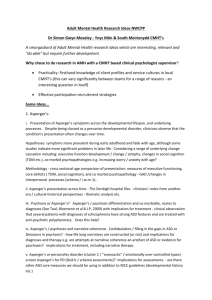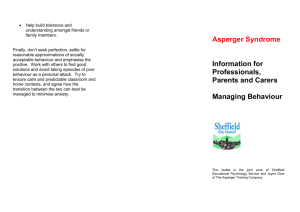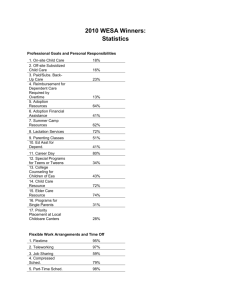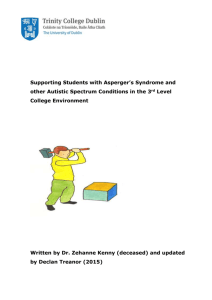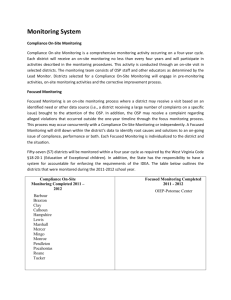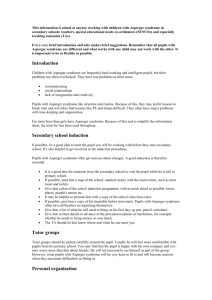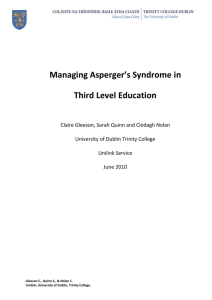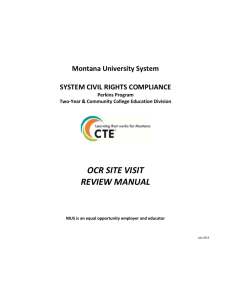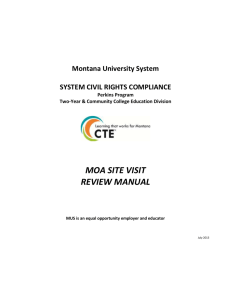Working with Students with Asperger Syndrome (Christie Johnson at
advertisement
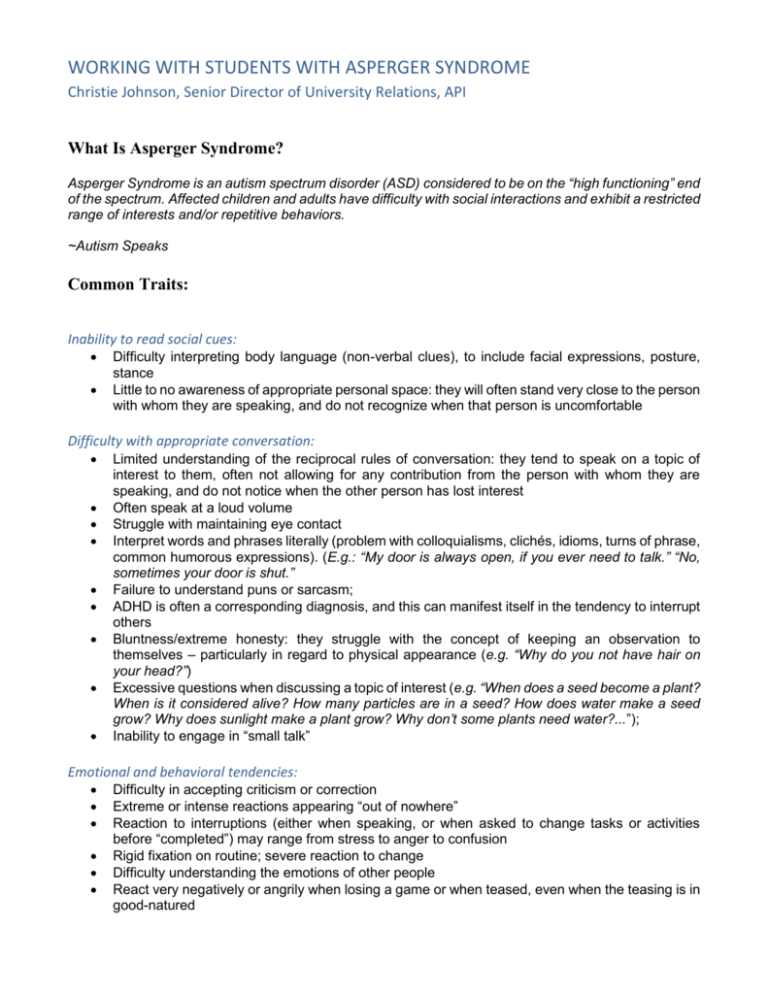
WORKING WITH STUDENTS WITH ASPERGER SYNDROME Christie Johnson, Senior Director of University Relations, API What Is Asperger Syndrome? Asperger Syndrome is an autism spectrum disorder (ASD) considered to be on the “high functioning” end of the spectrum. Affected children and adults have difficulty with social interactions and exhibit a restricted range of interests and/or repetitive behaviors. ~Autism Speaks Common Traits: Inability to read social cues: Difficulty interpreting body language (non-verbal clues), to include facial expressions, posture, stance Little to no awareness of appropriate personal space: they will often stand very close to the person with whom they are speaking, and do not recognize when that person is uncomfortable Difficulty with appropriate conversation: Limited understanding of the reciprocal rules of conversation: they tend to speak on a topic of interest to them, often not allowing for any contribution from the person with whom they are speaking, and do not notice when the other person has lost interest Often speak at a loud volume Struggle with maintaining eye contact Interpret words and phrases literally (problem with colloquialisms, clichés, idioms, turns of phrase, common humorous expressions). (E.g.: “My door is always open, if you ever need to talk.” “No, sometimes your door is shut.” Failure to understand puns or sarcasm; ADHD is often a corresponding diagnosis, and this can manifest itself in the tendency to interrupt others Bluntness/extreme honesty: they struggle with the concept of keeping an observation to themselves – particularly in regard to physical appearance (e.g. “Why do you not have hair on your head?”) Excessive questions when discussing a topic of interest (e.g. “When does a seed become a plant? When is it considered alive? How many particles are in a seed? How does water make a seed grow? Why does sunlight make a plant grow? Why don’t some plants need water?...”); Inability to engage in “small talk” Emotional and behavioral tendencies: Difficulty in accepting criticism or correction Extreme or intense reactions appearing “out of nowhere” Reaction to interruptions (either when speaking, or when asked to change tasks or activities before “completed”) may range from stress to anger to confusion Rigid fixation on routine; severe reaction to change Difficulty understanding the emotions of other people React very negatively or angrily when losing a game or when teased, even when the teasing is in good-natured Restricted and repetitive interests and behavior Often display behavior, interests, and activities that are restricted and repetitive and are sometimes abnormally intense or focused Repetitive routines provide feelings of security; stress when routine suddenly changes Limited diet, and disinterest in trying new foods The list of Common Traits can be daunting. However, there are some ways in which you can work with this student to make the experience easier on-site, and to foster a successful relationship and a successful experience abroad. Before the student departs: Speak to the student about strategies for success, areas they find challenging. When possible, speak to the family, therapist or counselor, advisors, and disability services office regarding coping mechanisms and accommodations. Encourage the student to allow permission to share the diagnosis with parties on-site. Educate on-site staff, host families, faculty, and fellow students about Asperger’s, when given permission to share the diagnosis. Schedule Skype meetings with on-site staff prior to departure to build rapport in advance of arrival. On-Site: 1) Avoid idioms, especially when giving instructions. 2) Provide notice when a routine must be changed. Example: if you normally have dinner together, but you have a social event so you’ll not be able to dine with her, let her know in advance. 3) Provide notice when he needs to transition between activities. Example: he’s working on the computer, but you are preparing to depart together for an errand. Tell him “we need to leave in 15 minutes.” You can remind him again, “we need to leave in 5 minutes.” 4) If you are sad, or angry or pleased or uncomfortable with something that happened or something he did, tell him. He may be unable to recognize this emotion based on your facial expressions or behavior. Examples: I am angry that you used my computer without permission. I am extremely sad because my sister was in a car accident, and I’m worried about her. I really appreciate that you helped clean up the kitchen. It upsets me when you say I am a big person. I really appreciate that you apologized for running late! 5) When conversing with her, be candid when her conversation is not appropriate, or you’d like it to end. Examples: I’d like to talk about something else now. I do not know the answers to your questions, but we can look it up on the Internet. I’d rather not talk about that – it’s too personal. 6) Ask him what his favorite foods are, and if there are any he intensely dislikes. Remember: many similarities exist between people with Asperger’s and newly arrived study abroad students in the height of culture shock. Specifically, both groups: Do not understand idioms, sarcasm in the host country language, and can interpret instructions literally. Cannot understand social cues or personal space, because these are very much culturally influenced. Become saddened by the lack of their familiar routine. May not like local foods. Do not understand the local norms regarding conversation.
